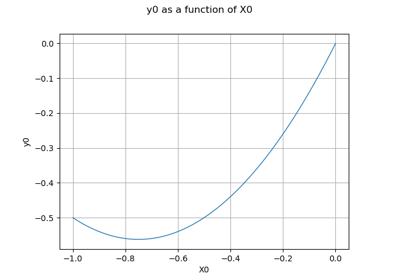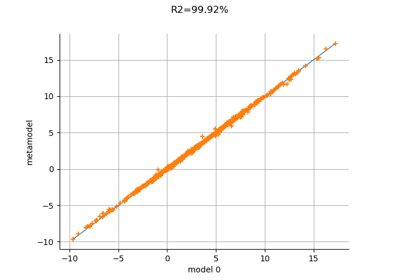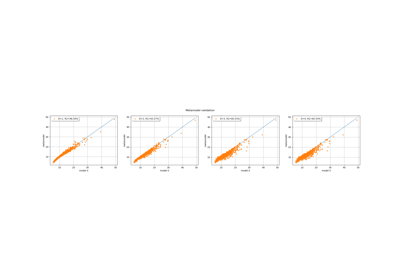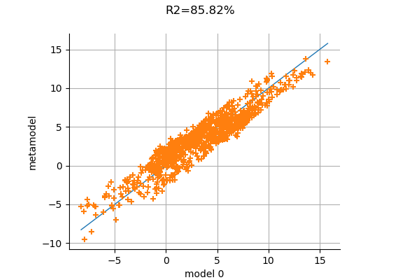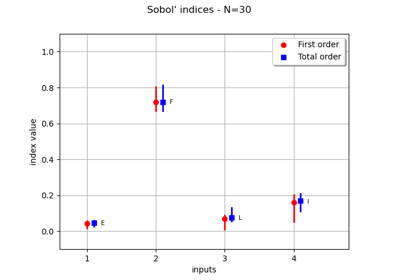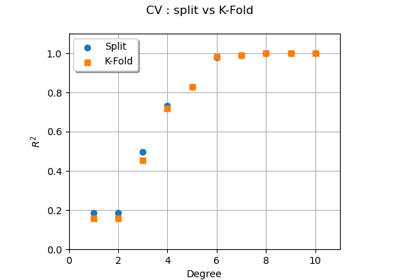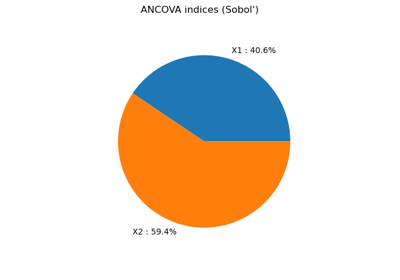OrthogonalProductPolynomialFactory¶
- class OrthogonalProductPolynomialFactory(*args)¶
Base class for orthogonal multivariate polynomials.
- Available constructors:
OrthogonalProductPolynomialFactory(polynomials)
OrthogonalProductPolynomialFactory(polynomials, enumerateFunction)
OrthogonalProductPolynomialFactory(marginals)
OrthogonalProductPolynomialFactory(marginals, enumerateFunction)
- Parameters:
- polynomialssequence of
OrthogonalUniVariatePolynomialFamily List of orthogonal univariate polynomials factories with the same dimension as the orthogonal basis.
- enumerateFunction
EnumerateFunction Associates to an integer its multi-index image in the
dimension, which is the dimension of the basis. This multi-index represents the collection of degrees of the univariate polynomials.
- marginalssequence of
Distribution List of physical space marginals.
- polynomialssequence of
Methods
add(elt)Add a function.
build(*args)Get the term of the basis collection at a given index or multi-indices.
Accessor to the object's name.
Return the enumerate function.
Get the input dimension of the Basis.
getMarginal(indices)Get the marginal orthogonal polynomials.
Get the measure upon which the basis is orthogonal.
getName()Accessor to the object's name.
getNodesAndWeights(degrees)Get the nodes and the weights.
Get the output dimension of the Basis.
Get the collection of univariate orthogonal polynomial families.
getSize()Get the size of the Basis.
getSubBasis(indices)Get a sub-basis of the Basis.
hasName()Test if the object is named.
isFinite()Tell whether the basis is finite.
Tell whether the basis is orthogonal.
Tell whether the basis is a tensor product
setName(name)Accessor to the object's name.
Notes
OrthogonalProductPolynomialFactory is a particular case of implementation of the
OrthogonalBasisin the case of polynomial chaos expansion. It provides to the OrthogonalBasis the persistent types of the univariate orthogonal polynomials (e.g. Hermite, Legendre, Laguerre and Jacobi) needed to determine the distribution measure of projection of the input variable. Let’s note that the exact hessian and gradient have been implemented for the product of polynomials.Examples
Create from a collection of orthogonal polynomials.
>>> import openturns as ot >>> polyColl = [ot.HermiteFactory(), ot.LegendreFactory(), ot.LaguerreFactory()] >>> productBasis = ot.OrthogonalProductPolynomialFactory(polyColl)
Easy way to create a multivariate orthonormal basis from a distribution.
>>> Xdist = ot.JointDistribution([ot.Normal(), ot.Uniform(), ot.Gamma(2.75, 1.0)]) >>> marginals = [Xdist.getMarginal(i) for i in range(Xdist.getDimension())] >>> productBasis = ot.OrthogonalProductPolynomialFactory(marginals)
Set an enumerate function.
>>> polyColl = [ot.HermiteFactory(), ot.LegendreFactory(), ot.LaguerreFactory()] >>> enumerateFunction = ot.LinearEnumerateFunction(3) >>> productBasis = ot.OrthogonalProductPolynomialFactory(polyColl, enumerateFunction)
- __init__(*args)¶
- build(*args)¶
Get the term of the basis collection at a given index or multi-indices.
- Parameters:
- indexint
Indicates the term of the basis which must be constructed. In other words, index is used by a bijection from
to
(with
the dimension of the basis). The bijection is detailed in
EnumerateFunction.- indicessequence of int
Indicates the term of the basis which must be constructed. In other words, indices is used by a bijection from
to
(with
the dimension of the basis). The bijection is the inverse of
EnumerateFunction.
- Returns:
- function
Function The term of the basis collection at the index index or the inverse of indices.
- function
Examples
>>> import openturns as ot >>> # Create an orthogonal basis >>> polynomialCollection = [ot.LegendreFactory(), ot.LaguerreFactory(), ot.HermiteFactory()] >>> productBasis = ot.OrthogonalProductPolynomialFactory(polynomialCollection) >>> termBasis = productBasis.build(4) >>> print(termBasis.getEvaluation()) -1.11803 + 3.3541 * x0^2 >>> termBasis = productBasis.build(5) >>> print(termBasis.getEvaluation()) 1.73205 * x0 * (-1 + x1) >>> termBasis2 = productBasis.build([1, 1, 0]) >>> print(termBasis2.getEvaluation()) 1.73205 * x0 * (-1 + x1)
- getClassName()¶
Accessor to the object’s name.
- Returns:
- class_namestr
The object class name (object.__class__.__name__).
- getEnumerateFunction()¶
Return the enumerate function.
- Returns:
- enumerateFunction
EnumerateFunction Enumerate function that translates unidimensional indices into multidimensional indices.
- enumerateFunction
- getInputDimension()¶
Get the input dimension of the Basis.
- Returns:
- inDimint
Input dimension of the functions.
- getMarginal(indices)¶
Get the marginal orthogonal polynomials.
- Parameters:
- indicessequence of int,
List of marginal indices of the input variables.
- indicessequence of int,
- Returns:
- polynomialFamilylistlist of
OrthogonalUniVariatePolynomialFamily The marginal orthogonal polynomials.
- polynomialFamilylistlist of
Examples
>>> import openturns as ot >>> funcColl = [ot.LegendreFactory(), ot.LaguerreFactory(), ot.HermiteFactory()] >>> productBasis = ot.OrthogonalProductPolynomialFactory(funcColl) >>> marginalProduct = productBasis.getMarginal([0, 2]) # [ot.LegendreFactory(), ot.HermiteFactory()]
- getMeasure()¶
Get the measure upon which the basis is orthogonal.
- Returns:
- measure
Distribution Measure upon which the basis is orthogonal.
- measure
Examples
>>> import openturns as ot >>> # Create an orthogonal basis >>> polynomialCollection = [ot.LegendreFactory(), ot.LaguerreFactory(), ot.HermiteFactory()] >>> productBasis = ot.OrthogonalProductPolynomialFactory(polynomialCollection) >>> measure = productBasis.getMeasure() >>> print(measure.getMarginal(0)) Uniform(a = -1, b = 1) >>> print(measure.getMarginal(1)) Gamma(k = 1, lambda = 1, gamma = 0) >>> print(measure.getMarginal(2)) Normal(mu = 0, sigma = 1)
- getName()¶
Accessor to the object’s name.
- Returns:
- namestr
The name of the object.
- getNodesAndWeights(degrees)¶
Get the nodes and the weights.
- Parameters:
- degreeslist of positive int (
)
List of
polynomial orders associated with the
univariate polynomials of the basis.
- degreeslist of positive int (
- Returns:
Examples
>>> import openturns as ot >>> # Define the model >>> myModel = ot.SymbolicFunction(['x1','x2','x3'], ['1+x1*x2 + 2*x3^2']) >>> # Create a distribution of dimension 3 >>> Xdist = ot.JointDistribution([ot.Normal(), ot.Uniform(), ot.Gamma(2.75, 1.0)]) >>> # Construct the multivariate orthonormal basis >>> polyColl = [ot.HermiteFactory(), ot.LegendreFactory(), ot.LaguerreFactory(2.75)] >>> enumerateFunction = ot.LinearEnumerateFunction(3) >>> productBasis = ot.OrthogonalProductPolynomialFactory(polyColl, enumerateFunction) >>> nodes, weights = productBasis.getNodesAndWeights([2, 3, 1]) >>> print(nodes[:2]) [ v0 v1 v2 ] 0 : [ -1 -0.774597 3.75 ] 1 : [ 1 -0.774597 3.75 ] >>> print(weights[:2]) [0.138889,0.138889]
- getOutputDimension()¶
Get the output dimension of the Basis.
- Returns:
- outDimint
Output dimension of the functions.
- getPolynomialFamilyCollection()¶
Get the collection of univariate orthogonal polynomial families.
- Returns:
- polynomialFamilylist of
OrthogonalUniVariatePolynomialFamily List of orthogonal univariate polynomials families.
- polynomialFamilylist of
- getSize()¶
Get the size of the Basis.
- Returns:
- sizeint
Size of the Basis.
- getSubBasis(indices)¶
Get a sub-basis of the Basis.
- Parameters:
- indiceslist of int
Indices of the terms of the Basis put in the sub-basis.
- Returns:
- subBasislist of
Function Functions defining a sub-basis.
- subBasislist of
Examples
>>> import openturns as ot >>> dimension = 3 >>> input = ['x0', 'x1', 'x2'] >>> functions = [] >>> for i in range(dimension): ... functions.append(ot.SymbolicFunction(input, [input[i]])) >>> basis = ot.Basis(functions) >>> subbasis = basis.getSubBasis([1]) >>> print(subbasis[0].getEvaluation()) [x0,x1,x2]->[x1]
- hasName()¶
Test if the object is named.
- Returns:
- hasNamebool
True if the name is not empty.
- isFinite()¶
Tell whether the basis is finite.
- Returns:
- isFinitebool
True if the basis is finite.
- isOrthogonal()¶
Tell whether the basis is orthogonal.
- Returns:
- isOrthogonalbool
True if the basis is orthogonal.
- isTensorProduct()¶
Tell whether the basis is a tensor product
- Returns:
- isTensorProductbool
True if the basis is a tensor product.
- setName(name)¶
Accessor to the object’s name.
- Parameters:
- namestr
The name of the object.
Examples using the class¶

Create a full or sparse polynomial chaos expansion
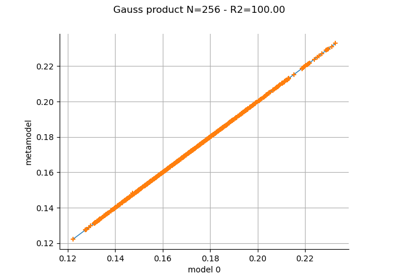
Create a polynomial chaos metamodel by integration on the cantilever beam
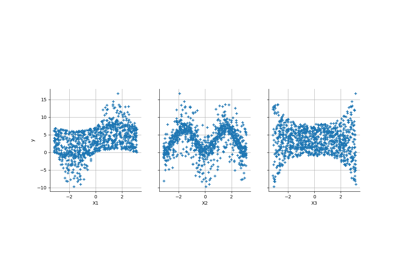
Create a polynomial chaos for the Ishigami function: a quick start guide to polynomial chaos
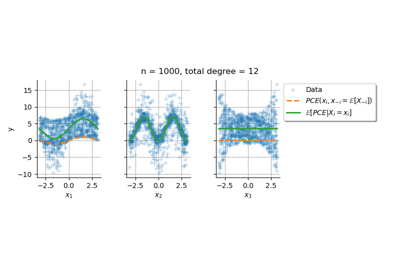
Conditional expectation of a polynomial chaos expansion

Create a multivariate basis of functions from scalar multivariable functions
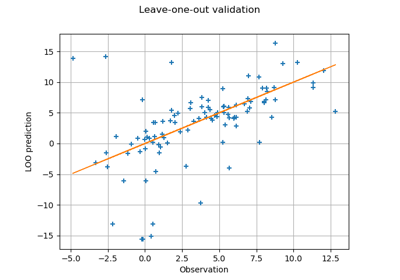
Compute leave-one-out error of a polynomial chaos expansion
 OpenTURNS
OpenTURNS
